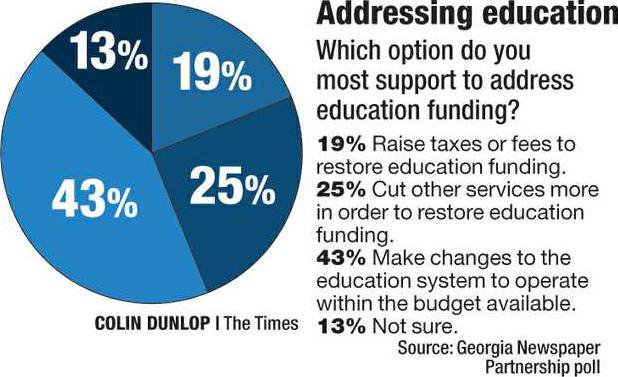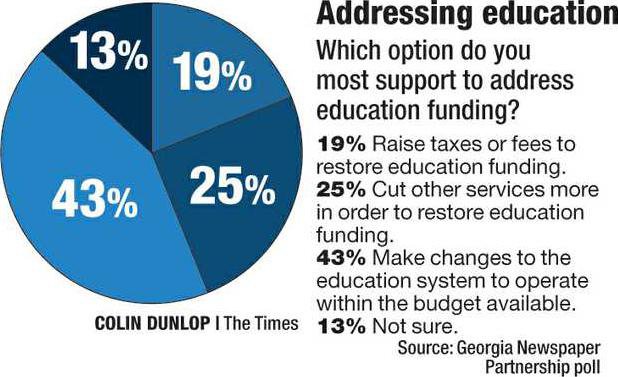About the Georgia Newspaper Partnership
The Times has joined with 13 other daily newspapers to provide comprehensive coverage of the gubernatorial and congressional campaigns. The partner newspapers have jointly commissioned this poll and two others that will be taken later in the political season. Information in some of today’s election stories have been provided by reporters at the partner papers.
About the poll
This poll was conducted by Mason-Dixon Polling & Research, Inc. of Washington, D.C., from Sept. 13 through Sept. 15, 2010. A total of 625 registered Georgia voters were interviewed statewide by telephone. All stated they were likely to vote in the November general election.
Those interviewed were selected by the random variation of the last four digits of telephone numbers. A cross-section of exchanges was utilized in order to ensure an accurate reflection of the state. Quotas were assigned to reflect voter turnout by county.
The margin for error, according to standards customarily used by statisticians, is no more than plus or minus 4 percentage points. This means that the “true” figure would fall within that range if the entire population were sampled. The margin for error is higher for any subgroup, such as regional or gender grouping.
The poll was commissioned by the Georgia Newspaper Partnership.
The economy and education go hand in hand, voters are telling gubernatorial candidates for this election season.
In a poll commissioned by the Georgia Newspaper Partnership, 47 percent of participants ranked the economy as their most important issue, and education came in second at 15 percent.
The poll was conducted last week by Mason-Dixon Polling & Research, which surveyed 625 Georgians likely to vote in November’s gubernatorial election.
“I’m not surprised at all. The two biggest issues are jobs and education, and the incredible thing we’ve known for a long time is that you can’t separate the two,” said Hall County Schools Superintendent Will Schofield. “I’m glad to hear that even in these economic times, what we do in terms of getting the next generation ready for college, work and life is incredibly important. It gives me great hope.”
Budget concerns have brought an even sharper focus on education, said Gainesville City Schools Superintendent Merrianne Dyer.
“The awareness that education has been underfunded has come to light with budget cuts. There is the concern that kicking up the economy takes a prepared work force,” she said. “To get things rolling again, we need to have prepared workers for the new generation that can increase productivity and raise the economic standard.”
In recent reports of poverty in the U.S., the highest concentration is in Texas, California and the southern states, she said.
“Take our schools and look at them. We have a pretty significant level of poverty, and it’s going up,” she said. “Poverty is the enemy of education because of family issues, such as mobility and not staying at one school, access to health care, family stability and the economic background of parents. It takes time and effort to address the issues of poverty, and it’s not just a school thing.”
The emphasis on education also shows that voters are frustrated, said Douglas Young, a political science professor at Gainesville State College.
“State and local governments are spending record amounts of education, and it’s only gotten worse. More money is simply not helping fundamental reform,” he said.
Young said Democratic gubernatorial candidate Roy Barnes “is to be commended for standing up to teachers’ unions about tenure. Competition is what brings out the best in people.”
In another question, poll respondents were asked how they would address cuts in education funding — by raising taxes, cutting other services, or making changes to the education system to operate within the budget. About 19 percent would raise taxes, 25 percent would cut services and 43 percent would operate within budget constraints. The remaining 13 percent were unsure.
“I believe, in these unprecedented economic times, it’s our responsibility to live within our means,” Schofield said. “We make sure that we’re collecting the taxes we’re due, but education does not exist in a vacuum. We’re all going through this storm together. That’s what we’ve been about — do more with less and find ways to allow teachers to innovate. It’s a realistic point of view.”
Voters are relating to their own finances, Dyer said.
“Living within their means is something everyone in this country has had to take an internal look at,” she said. “Certainly there are efficiencies that the education system can put into place. We’ve learned that.”
However, it’s tougher when parents confront what that means in the classroom.
“When you walk up and ask if someone is willing to give up Advanced Placement classes, arts education at every school or field trips completely, there’s a lot of resistance,” Dyer said. “Living within your means is a middle ground. You want everyone to do it, but it’s tough when it’s in your backyard.”
Meredith Milby, 33, of Gainesville, was a poll participant who suggested raising taxes.
“Other services and budgets within the education system have been significantly cut, and additional cuts would be detrimental,’ she said. “They’ve already been trimmed as much as we can realistically expect.”
Milby draws on her experience of going to school in Georgia.
“I was in school when the lottery was instituted and was able to see what benefit came from getting extra money in the classrooms,” she said. “The education system is improved with an influx of money. Additional money would help much more than cutting other government services.”




